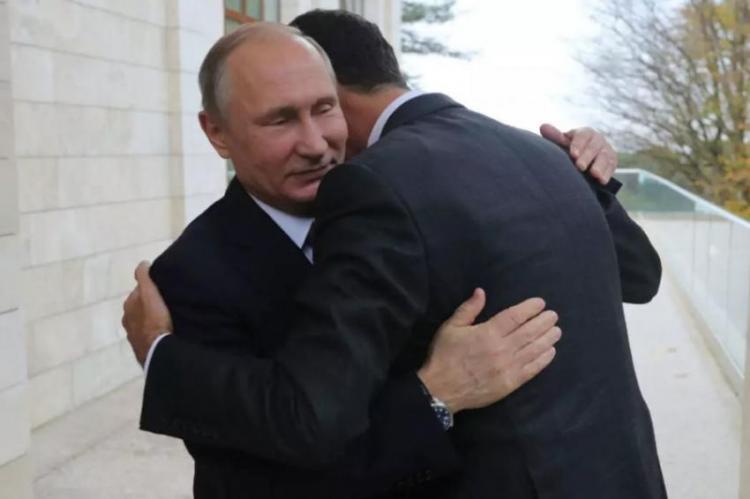Serious indications Assad may step down – Syrian opposition
Cairo – North-Press Agency
Muhammad Abu Zaid
Two prominent Syrian opposition figures said in separate statements to North-Press that there are indications confirming talk of a consensus within the Astana countries on the resignation of Syrian President Bashar Assad in light of changes in international attitudes.
The opposition figures argued that such information associated with an agreement between Russia, Turkey, and Iran is informal, but there are serious indicators of this, including the soon-to-be-enforced Caesar Act.
Guesses and indicators
Yahya al-Aridi, the head of the media office of the Syrian Opposition's High Negotiations Committee (HNC), commented in remarks to North-Press on what is being discussed regarding the Astana agreement (which includes Russia, Turkey and Iran) on removing Assad, saying: "What has arrived so far is nothing more than leaks based on analyses and guesses. It may be true, or maybe not." At the same time, he talked about many indicators that confirm these suspicions or at least bring them closer to reality.
The most prominent of these indicators starts from investigations into the use of chemical weapons, which directly referred to the Syrian regime. There is also the Caesar Act, which will enter into force in a little over a month. It will become reality and a weapon controlling not only the regime and its human rights violations, but everyone who helps it, specifically Russia and Iran.
Economic moves
Al-Aridi said that there is another side to these indicators, which is some economic moves through which the head of the regime and its surroundings seek to appear as loyal by targeting major economic players in the Syrian economy and those who loot public money. This way, Putin can present him to the world, but it is revealed that the two are two sides of the same coin, whether the regime or Rami Makhlouf.
Al-Aridi stressed, "Turkey certainly remains firm in its stance, and I think that what has been broken with the regime cannot be fixed while the Iranian stance remains the same. This is unlikely for Iran, because its exit from Syria and the end of its presence there means the end of its malicious project for the region as a whole."
The Iranian Foreign Ministry denied its participation in any discussions with Ankara and Moscow through the Astana track which revolve around the future of Syria without Bashar Assad.
Iranian Foreign Ministry spokesman Abbas Mousavi said: "The news circulated about drawing the future of Syria through the Astana track does not reflect the truth," according to the state-run Iranian Student News Agency ISNA.
Mousavi stressed, "The Tehran administration always stands beside the Syrian state and its people," adding that "any decision regarding the future of Syria, the Syrian people must make."
Al-Aridi said: "I do not know to what extent these leaks and suspicions are correct, but they are surrounded by events and developments that must be taken into consideration, especially as what Russia has accomplished militarily has not brought it any political gain; it may worsen things furthern, and its presence in Syria will become as the Soviet presence in Afghanistan."
Al-Aridi added that "at its most significant level, especially as we hear that any attempts to rehabilitate or re-establish relations with the Assad regime are fraught with many dangers that America itself speaks of which hints at the Caesar Act toward those powers that want to restore relations."
Assad's removal
Doctor Reyad Naasan Aga, Syrian opposition figure and former member of the HNC, pointed out in a special statement to North-Press that the leaks also indicated that the president's dismissal is possible.
"There is no official news about this agreement on the removal of Assad, but there are indications that this may happen, most important of which is the Russian media campaign against the Syrian regime, although it is also unofficial," Aga said.
"This is in addition to the upcoming implementation of the Caesar Act and hints dropped by Envoy Jeffrey, worsening economic situation in Syria and the conflicts within the ruling family."
All this according to Aga, suggest the necessity of change. There are expectations from influential figures about the possibility of Assad's removal from or abdication of power, indicating that he expects Russia make a complete review of the situation, especially in front of the international insistence on getting Iran and its militias out of Syria.
As he pointed out, "Syrians in general insist on starting the serious implementation of the Security Council Resolution 2254, which is the easiest possible solution, with the formation of a military council that guarantees security during the transitional stage."
Russian mass media mentioned recently that Moscow, Ankara, and Tehran planned to form an temporary government in Syria that includes opposition forces and excludes Assad.
Turkey, Russia, and Iran aim through following Astana to reach a political solution that includes all parties in Syria and ends the 9-year-long civil war.
These leaks come at a time when the relationship between Moscow and Damascus is weak because of the Syrian government’s policies, its refusal to underestimate its mandate, and its inability to stop widespread security chaos and corruption in the areas under its control. This makes Russia fear the loss of what has been achieved through its direct intervention in Syria since 2015.

